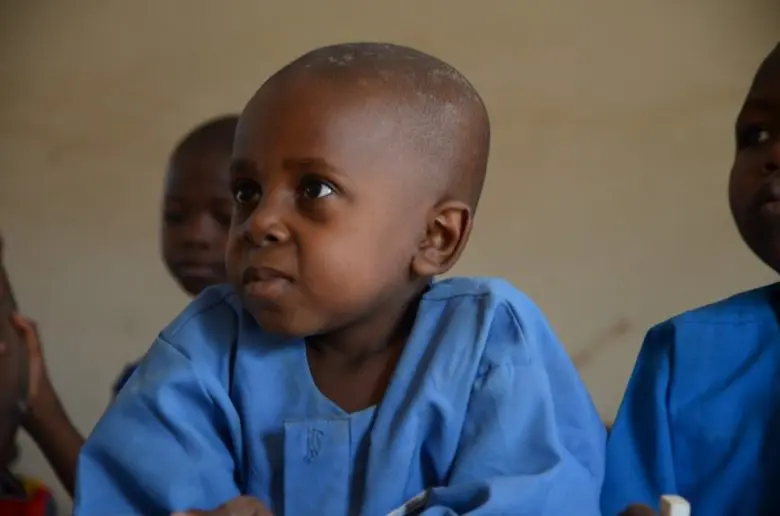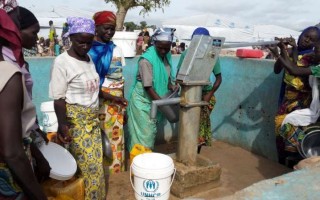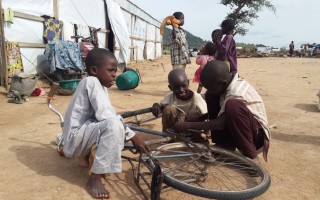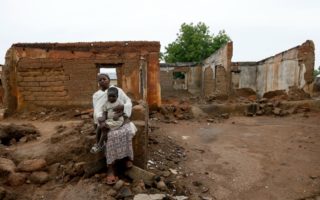
Azaiya sits in the front row of his class in Ikyogen settlement, Nigeria. © UNHCR/Roland Schönbauer
Cataracts gradually robbed six-year-old Azaiya of his sight. A corrective operation allowed him to see a world with opportunities.
By Roland Schönbauer in Adikpo, Nigeria
After living with impaired vision for much of his six years, Aziaya recalls the exact moment the world swam back into view.
“The first thing I saw was the shining white hospital dress I was wearing,” he recalls.
The Cameroonian boy’s face lights up with a dazzling smile as he greets the visitors who have come to check on him at his home at Ikyogen refugee settlement in south-east Nigeria.
“I am happy I can see,” says Azaiya, adding, “And that I can go to school.”
His outlook has not always been so bright. When he fled Cameroon three years ago, he could hardly distinguish light from darkness. Living with cataracts that left him visually impaired, his stepsister, 39-year-old Onal, had to carry him through the forests to safety.
“I am happy I can see and that I can go to school.”
At the settlement that UNHCR, the UN Refugee Agency built to receive families fleeing the conflict between secessionist forces in north-west and south-west Cameroon and the military, Azaiya could not make a step on his own.
Uneven footpaths, open channels in the rainy season, fireplaces and poles between shelters all posed additional risks for him. Trips to the latrine required someone to take him by his hand and going to school was a distant dream.
But help came when UNHCR staff reported his difficulties to health partner FHI 360. Medics promptly diagnosed congenital cataracts – a lens opacity present since birth.
“Left unattended, it worsened over time as his vision progressively deteriorated,” explains Ernest Ochang, UNHCR’s Assistant Public Health Officer based in the city of Ogoja.
Azaiya needed eye surgery, so UNHCR and FHI 360 made the critical intervention possible in June 2020.
Forced displacement is particularly tough for people with disabilities like Azaiaya, as they are often at higher risk of violence, exploitation and abuse. They can face barriers in accessing basic services, are often excluded from education and can face discrimination when looking for work.
When Azaiya later returned to the settlement, equipped with a pair of glasses, his world opened up. While his vision is still classed as ‘low,’ he does not have to depend on others to move about. More importantly, he can go to school unimpeded.
Taking a seat in the first row of desks, Azaiya has begun to read and write. While his eyes seem to falter at times, his progress is visible to staff.
“He is trying to read from the blackboard and is making little progress, but progress all the same,” explains Akule Lucy Angbiandoo, his teacher at the local primary school.
In the school playground, he plays just like any other student. The improvements in Azaiya’s life have also helped his stepsister Onal, who became the family’s main breadwinner after her brother died in the conflict across the border in Cameroon.
She farms cassava, rice and corn. But as Azaiya needs less handholding, she also has time to pursue her former trade as a tailor. UNHCR supported her to take a fashion design course, and thanks to some financial support from Save the Children, where she worked as a volunteer, she now has a new sewing machine. She makes clothes for children in her shelter and hopes to open a shop in the settlement’s main square.
“He is making little progress, but progress all the same.”
About 100 people live with a disability in Ikyogen settlement. UNHCR seeks to help them by ensuring they are included in decision making processes and have access to psychosocial support, if needed.
Onal still has moments of sadness when she mourns her brother. But when Azaiya comes to her shelter, her spirits get a lift. Soon, boys and girls from the other shelters surround him – they all want to hear his story again and again.
He enjoys the attention and looks at his friends with a grin. Inspired by the surgeon who changed his life, he wants to become one too and work in a hospital one day.
“Call me Dr. Asuquo!” he says, referring to the name of the doctor who led his surgery.
Everyone bursts out in laughter, awed by the precocious boy’s nature. And his dazzling smile.
Additional reporting by Lucy Agiende in Ogoja, Nigeria
Originally published by UNHCR on 25 February 2021.





